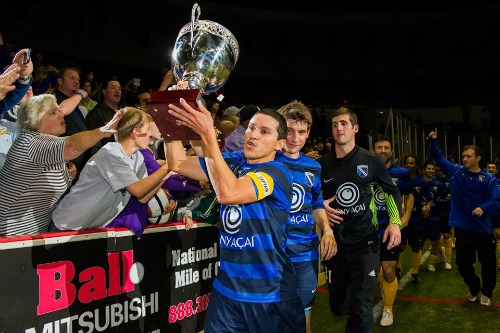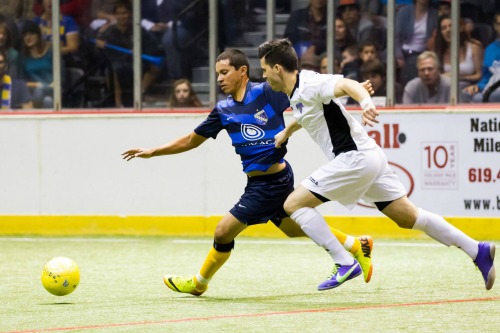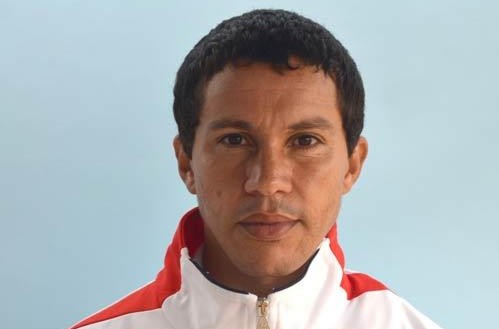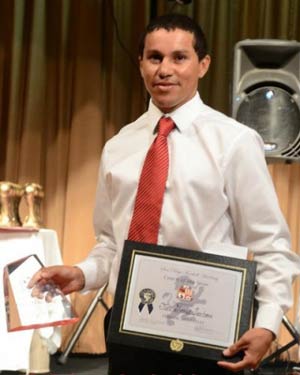Ze Roberto Brings Brazilian Flair and International Experience to Youth Coaching
Spotlight on SDFA’s Coach of the Year Ze Roberto – known as one of the best and most influential professional players, Ze Roberto was USL Hershey Wildcat’s Rookie of the Year when he first came to America. The former MLS player, Ze Roberto now plays for the Championship San Diego Sockers and coaches youth soccer at San Diego Football Academy.
Most San Diego soccer fans know José “Ze” Roberto as a key member of the four-time Professional Arena Soccer League (PASL) champion San Diego Sockers. The power-packed 5’7” Roberto is a leader on the team’s defense and is a constant force blocking opposing teams’ top scorers. The fans love and cheer for him as a top professional soccer player but for those at the San Diego Football Academy (SDFA) he is simply “Coach Ze.”
Growing up in Brazil, soccer was Roberto’s great passion. He fondly remembers how, as a boy, he could never leave the room when a game came on the television. However, with all of the talent in the country, becoming a professional in Brazil is a great challenge, and one Roberto was determined to achieve.
After playing professionally in Brazil, Europe and North America, Roberto finally settled in his wife’s hometown of San Diego, signing with the SD Sockers. There he also attracted the attention of SDFA Technical Director Johnson Asiedu. Bringing the speedy defender onto the youth coaching sidelines at SDFA was initially a challenge for Asiedu, and one that paid off quickly for everyone.
SoccerToday News Editor Diane Scavuzzo caught up with Roberto to ask him about his role as a coach with SDFA and how his professional career has impacted it.
Diane Scavuzzo: What insights does being a professional player give you as a youth coach?
Ze Roberto: I believe it is a great advantage. I try to explain the challenges that I go through in a professional game to the kids. I want my players to understand what it is like. Sometimes a game gets intense and you don’t always make the right decisions, but you learn from making mistakes. I want to teach the kids that they shouldn’t overreact and just enjoy the game because that is what is most important.
|
|
Diane Scavuzzo: How would you describe your philosophy of coaching?
Ze Roberto: It is important to me to help the kids to be physically fit and technically sound so as they grow older they will still be able to play the game. It is key that younger players understand and know the basics. The game becomes more technical and demanding as players age.
My philosophy is to encourage the kids to take chances and play the game the right way — because that’s how they get the most out of it. Even their mistakes are part of the game. I tell them they are going to learn from the mistakes they make during the game, so I encourage them to take chances.
I don’t want the kids just to punt the long ball up the field. Of course sometimes a kid is going to send a long ball, but they have to understand when it is the right time to do that.
If you’re not playing the game the right way you’re not going to get a lot out of it.
When I work with my kids I try to have them think more when they play. I try to challenge them to think about what they are going to do with the ball when they get it.
You can’t play this game like you’re running around with your head cut off. This game is about thinking. I want them to think about the decisions they make on the soccer field.
Diane Scavuzzo: What does the term “player development” mean to you?
Ze Roberto: For young players to develop properly, they need to have the right information. Young soccer players need to be technically sound. For example, a player needs to be able to strike the ball with both feet, to head the ball, and to have good vision. It is the coach’s responsibility to show players how to play the game in a better way.
Diane Scavuzzo: What do you think about player development in America?
Ze Roberto: From what I have seen in San Diego, we have some good clubs and good players. There is a lot of talented kids playing youth soccer in Southern California.
| Johnson Asiedu on Ze Roberto
When I first met Ze, he was not so sure about coaching, but I told him what we were trying to accomplish at the Academy. I was able to persuade him to come on a short-term basis and remain if he liked it – which he clearly has. I have really enjoyed working with Ze for the past three seasons, and I know he appreciates SDFA’s focus on technical development and the long-term vision of our club. Coach Ze was awarded 2013 Coach of the Year because he developed three teams from the ground up, with players who had never played soccer before or who were coming from a low level technically.” Ze is someone the Academy staff can always count on, and he will give freely of his time to help anyone out. For me, personally, he has become a friend that I can rely on to carry out the SDFA philosophy. |
While there is talent but not always the dedication needed. If kids really want to become professionals, they have to be more dedicated. I think there are a lot of great coaches in San Diego who can help kids develop, if they really want to become professionals.
Diane Scavuzzo: What do you think is most important – soccer IQ, tactical awareness, mental strength, physicality – or is it a combination.
Ze Roberto: I think it is a combination, but if you are mentally strong you can be able to overcome any difficulties that come your way. Things are going to happen. No matter where you go, you’re going to find moments and times that are going to be difficult. If you are mentally strong, you have the tools you need to move on and be able to fight through those difficult moments.
Diane Scavuzzo: How competitive are your teams?
Ze Roberto: I think my teams are very competitive. The boys have all done well.
Diane Scavuzzo: What is it like coaching soccer in America?
Ze Roberto: It’s difficult in this country because there are some kids with a lot of ability and some who don’t have as much, and you try to have a mix between the players. Working with U8 or U9, you often have to go back to the beginning with the basics – how to pass the ball, what part of the foot you use to pass.
Diane Scavuzzo: How much time should a player spend outside of team practice?
Ze Roberto: I always encourage players to put in extra time on their own because I don’t think we have enough time in team practices. If it was up to me I would love to have my teams practice five times each week, but unfortunately that is impossible. The boys practice about three times each week – we have two days a week and usually on Fridays we have shooting and skills clinic.
Diane Scavuzzo: When you recruit players for your teams, what do you look for?
Ze Roberto: When I watch players, I’m not just looking for the best ones on the field. While I do look for players who have skills, that’s not the only thing I look at. I look for the ones who play the game with a lot of intensity and put 100 percent into what they do. It’s good to have players who have the tools, and you can work with them and help them improve, but a player’s attitude is more important. You can teach the skills.
Diane Scavuzzo: Do you think there is any one key piece of advice for a player who wants to become a professional?
Ze Roberto: Success has to come from within the player.
As a coach there is only so much that you can do.
If a player really wants to, he can make a huge difference in his game. The time a player spends practicing and working in the areas her or she needs to improve will determine whether the player will become a pro or not.
You can be a very technically gifted player, but you really have to have the desire to become a professional soccer player. Without the desire to play the game at the highest level, you won’t make it.
I have seen a lot of very good players, but they didn’t have the desire and committment to go far. Without the drive from within the player it becomes difficult to put the work in week after week.

Diane Scavuzzo: How did you become mentally strong?
Ze Roberto:
The way I grew up in Brazil – my mother died when I was young – I had to learn to be strong from the beginning, so I’m mentally strong for situations like that.
Diane Scavuzzo: Do you think it is important for youth players to travel?
Ze Roberto: I think it is good for young people to travel and experience different environments. It helps them grow mentally because it can be intimidating when they go to a place for the first time or when they play against somebody else they don’t know. If they are not used to these situations it can hold them back.
Travelling is definitely good for the players. They start to grow and become mentally stronger. Eventually as you get older you have to walk on your own. If you’re going to play pro, you’re going to go to new places. If you don’t know how to deal with that, it will be difficult. You get used to the things around you, but can you handle the situations you are not used to?
Diane Scavuzzo: Tell me about when you were young. Did you always know you wanted to be a soccer player?
Ze Roberto: That was my dream from the beginning. Whenever I saw a game on TV I couldn’t walk away, I had to sit down and watch it. I’ve always enjoyed playing and I still enjoy it.
Diane Scavuzzo: What was it like playing soccer in Brazil?
Ze Roberto: There were a lot of challenges. One of the most difficult things to do is become a professional soccer player in Brazil, where you have so much competition.
I signed my first pro contract when I was about 18 years old with Tuna Luso Brasileira and I played in the Copa Sao Paulo. After the tournament my club signed me with an agent. I went to Italy and played in 1998 and 1999 with Salernitana.

Diane Scavuzzo: Did you like playing professional soccer in Italy?
Ze Roberto: It was exciting to be there. It was my first time so far away from home. You just want to make it as a pro. You want to have the opportunity to play and have the experience. I was there with two other players from Brazil, and I enjoyed it.”
Diane Scavuzzo: When did you come to the United States?
Ze Roberto: I came to the U.S. in 2000 and played in the USL with the Hershey Wildcats. Then in the winter I wanted to go back to Brazil, but my agent told me to stay so I stayed and played for the Harrisburg Heat. I didn’t care where I was as long as I was playing — I was happy.
After Harrisburg I spent six seasons with Montreal Impact, (Canadian professional soccer team based in Montreal, Quebec that competes in MLS.) From there I went to play with the Vancouver Whitecaps in 2007. In between seasons I played indoor with Harrisburg, Philadelphia and Detroit. Then I went to the Rochester Rhinos. After that I came to San Diego because my wife is from here.
Diane Scavuzzo: You have been playing professionally for a number of years. What do you like best about being on the field playing?
Ze Roberto: When I’m on the soccer field I forget about everything else. To me it’s about the joy of being on the field playing. Even if I’m having a bad day and everything seems wrong, I just focus on playing in the moment. I love the game so much.
Diane Scavuzzo: What professional player did you look up to when you were growing up?
Ze Roberto: Growing up I always looked at Zico as one player who always stood out.
Zico is a Brazilian coach and former footballer who is often called the “White Pelé”. Zico he is one of the most skilled finishers and one of the best passers ever, and possibly the world’s best player of the late 70’s and early 80’s.
Diane Scavuzzo: Do your kids and their parents look at you differently after they see you playing in a professional game?
Ze Roberto: The parents tell me they are so glad I’m coaching the kids. A lot of coaches are no longer playing, and when you’re playing the kids look at you differently and so do the parents. It’s good to hear what the kids say after the game. They’ll say, “Coach, I enjoyed it so much. It’s so physical!” And I tell them, “I know it’s physical, that’s how it’s supposed to be played.”
Diane Scavuzzo: What do you like about working with Johnson Asiedu and Jen Lalor-Nielsen at SDFA?
Ze Roberto: I think Johnson and Jen are great people and really great coaches.
They are very humble people. You can sit down with them and ask a question and they will give you a straight answer. I like the philosophy of the club. I think that the goals the club has are very good and I’m pleased to be here.
Diane Scavuzzo: Do you have any other goals as a coach?
Ze Roberto: I would like more young players from San Diego be able to play elsewhere. There is so much talent in San Diego, and I would love to see players from San Diego in the U.S. Youth National Teams. I think that would be fantastic.







